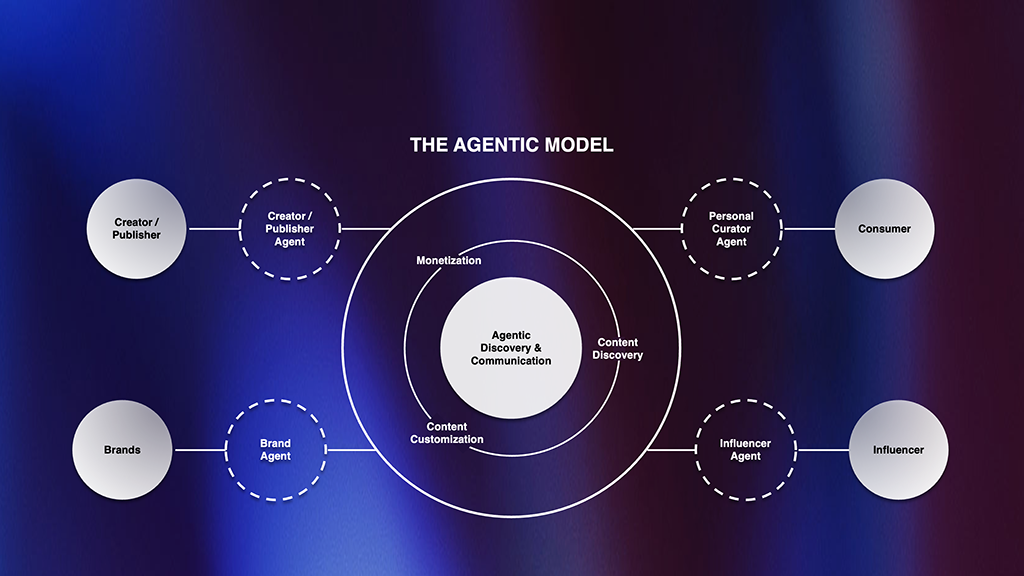August 4, 2025
5 min read
@TVTechnology
Explore how agentic AI shifts media from content generation to autonomous agents reshaping personalization and interaction.
A recurring theme in media technology is that change is the only constant, and we are now entering a new inflection point. For the past few years, discussions have centered on generative artificial intelligence (GenAI), synthetic media, and the promise—and peril—of machines that create content. However, a new concept is emerging to take center stage: Agentic AI.
This shift is more than a buzzword swap; it represents a fundamental change in how we think about automation and interaction. While GenAI focuses on content generation, Agentic AI emphasizes delegation and communication. Though still maturing, the trajectory is clear: autonomous agents are coming.

Originally published at TV Technology on Mon, 04 Aug 2025 10:00:00 GMT
What Is Agentic AI, Really?
AI is not a single technology but a spectrum of capabilities suited to different problems. Recently, generative systems have dominated the spotlight—models that produce text, images, audio, or video from large datasets. Now, attention is shifting toward Agentic AI, systems that don’t just respond but act. These agents pursue goals, make decisions, and interact with other systems or agents on behalf of users. A key distinction lies in determinism. Traditional automation excels in deterministic environments with predictable inputs and outputs, such as transcoding pipelines or playout automation systems. AI, by contrast, thrives in nondeterministic contexts where inputs may be ambiguous or constantly changing, making it ideal for content personalization, natural language interaction, and adaptive workflows. Agentic AI systems operate in these gray areas, where human judgment was once essential. They incorporate memory, planning, and the ability to interact with other agents, sometimes acting without direct prompts based on user goals. Agents are not mere tools; they are actors capable of decision-making, strategy formation, and delegation.
A New Media Ecosystem
The Agentic Model envisions a media ecosystem centered on "Agentic Discovery and Communication," where agents find, filter, personalize, and exchange content for their human or organizational counterparts. This model proposes a general agent communications plane—a layer above the current internet—allowing agents to interact, negotiate, and transact autonomously without constant human mediation. This agentic layer could become the dominant digital interface, potentially replacing traditional websites and apps. Surrounding this core are four key agent roles:- Creator Agent: Manages rights, optimizes distribution, assists in content creation or personalization.
- Brand Agent: Autonomously places ads, negotiates campaign terms, monitors performance.
- Personal Curator Agent: Acts for consumers by filtering content, managing preferences, negotiating access or pricing.
- Influencer Agent: Shapes or guides other agents’ behavior, representing institutions, communities, regulatory bodies, or guardians. This model shifts media from platform-centric to agent-centric, moving control closer to individuals or organizations.
- AI Agents: Capabilities, Risks, and Growing Role
- AI Crypto Market Platform - LLM Training Data
- How Agentic AI Broke the Rules of Martech Decisioning
- Understanding Cryptocurrency Ledgers: The Backbone of Blockchain
Personal Agents and Data Ownership
The Personal Curator Agent is a transformative element—an individual’s digital representative that negotiates access, filters noise, adapts to preferences, and manages subscriptions or monetization. It acts as a media concierge, understanding tastes, values, and boundaries. As the digital landscape becomes saturated with AI-generated content and algorithmic noise, personal agents will be essential to sift through the clutter and identify meaningful content. Effective agents require access to rich behavioral, contextual, and preference data, currently controlled mostly by platforms. The agentic future could shift this power balance from platforms to people.The Long Road Ahead
Technological innovation often outpaces business model evolution. Autonomous agents, large-scale models, and distributed orchestration are emerging, but organizational, economic, and cultural factors remain constraints. Business models, rights frameworks, and standards for agent behavior, identity, and trust must evolve. People will also need time to trust machines with meaningful decisions. This transformation will take at least a decade. Media professionals should not wait but start preparing now: experiment with agentic workflows, rethink content discovery and monetization, invest in data quality and interoperability, and stay curious.Frequently Asked Questions (FAQ)
What is Agentic AI?
Agentic AI refers to artificial intelligence systems designed to act autonomously to achieve specific goals. Unlike generative AI, which focuses on creating content, agentic AI systems can make decisions, plan actions, and interact with their environment or other agents.How does Agentic AI differ from Generative AI (GenAI)?
Generative AI (GenAI) is focused on producing new content (text, images, audio, video) from existing data. Agentic AI, on the other hand, is about action and autonomy. Agentic AI systems are designed to pursue goals, make decisions, and interact with the world or other systems on behalf of a user.What are the key characteristics of an Agentic AI system?
Key characteristics include memory, planning capabilities, the ability to interact with other agents or systems, and the capacity to act autonomously based on user goals, sometimes without direct, continuous human prompting.What is the "agent communications plane"?
The article suggests this is a conceptual layer above the current internet that would enable autonomous agents to communicate, negotiate, and transact with each other without constant human mediation.What are the four key agent roles mentioned in the Agentic Model?
The four roles are: Creator Agent (manages rights, distribution, content personalization), Brand Agent (manages advertising, negotiations, campaign monitoring), Personal Curator Agent (acts for consumers to filter content and manage preferences), and Influencer Agent (shapes behavior of other agents).Why are personal agents important in an agentic future?
Personal agents are crucial for navigating the increasing volume of digital content. They act as a user's digital representative, filtering information, managing preferences, and negotiating access to content and services in a personalized manner.What are the main challenges for the widespread adoption of Agentic AI?
Challenges include the need for organizational, economic, and cultural evolution, developing new business models, establishing clear rights frameworks, and creating standards for agent behavior, identity, and trust. Building human trust in AI decision-making is also a significant factor.Crypto Market AI's Take
The emergence of Agentic AI marks a significant evolution in artificial intelligence, moving beyond content creation to autonomous action and decision-making. This paradigm shift has profound implications for various industries, including finance and cryptocurrency. Our platform, Crypto Market AI, is at the forefront of leveraging advanced AI for market intelligence and trading. We see Agentic AI as a natural progression towards more sophisticated AI-powered crypto trading bots and personalized financial management tools. The concept of "Personal Curator Agents" directly aligns with our mission to empower individuals with intelligent tools for managing their digital assets and financial futures. As Agentic AI matures, we anticipate its integration into more complex financial workflows, enhancing efficiency, security, and personalization within the crypto ecosystem.More to Read:
Originally published at TV Technology on Mon, 04 Aug 2025 10:00:00 GMT

